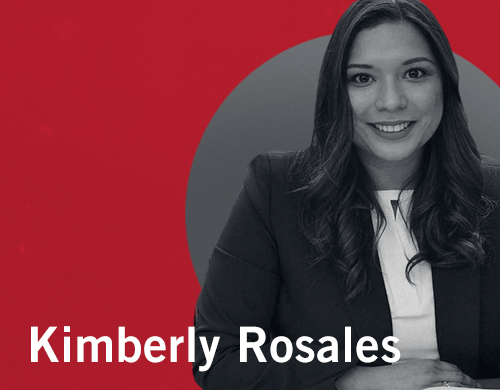 March 27, 2023
March 27, 2023 Kimberly Rosales is an attorney at Waters Kraus Paul & Siegel in the firm’s Dallas office. Kimberly’s practice concentrates on asbestos litigation. She earned her bachelor’s degree cum laude at the University of North Texas, and her Juris Doctor at UNT Dallas College of Law. During her time in law school, she served as president of the Hispanic Law Students Association, was a member of the law review as well as the College of Law board of advocates. Kimberly was a recipient of both the William E. Collins clerkship at the Dallas City Attorney’s Office and the Dallas Hispanic Law Foundation scholarship in 2018. She was admitted to the State Bar of Texas in 2020. Kimberly is fluent in Spanish.
Read on to learn what Kimberly had to say during our Women’s History Month virtual round table.
Waters Kraus Paul & Siegel Women In Law Roundtable Q&A: Kimberly Rosales
Waters Kraus Paul & Siegel: According to the American Bar Association, there are approximately 1.4 million licensed attorneys in the United States. While there may be obvious overlap in experiences and reasons for choosing to become a lawyer, no two people are the same. What, or who, inspired you to pursue a career in law?
KR: I was interested in the legal system and advocating for others, especially the Latino/Hispanic community. I joined the pre-law program at my undergraduate university to explore more career options and obtained a certificate in Legal Studies. Throughout this process, I realized the need for more Spanish-speaking attorneys and applied to law school. Once I started law school, endless opportunities presented themselves, and I developed a high interest in torts. Now I am proud to represent mesothelioma, lung cancer, and mass tort clients. I am incredibly passionate about representing my Spanish speaking Mesothelioma clients as well.
WKPS: Continued determination and a tough work ethic are part of a universal code shared among successful attorneys. In fact, a career as a lawyer has been a hallmark of prestige for generations now. But what exactly enabled your career to flourish? How would you personally encourage young girls thinking about becoming attorneys?
KR: While tough work ethic and determination are key, putting myself out of my comfort zone and not giving into fear has enabled exponential growth in my career. I remember how nerve-wracking my first asbestos deposition was. I represented a life-time mechanic against 14 defendants early in my legal career. It would have been easy to say, “I am not ready for this,” or “I don’t know the first thing about cars and brakes, so why am I doing this?!” Instead, I did not give into my fears, rather, I relied on my mentors, prepared, practiced, and educated myself on asbestos-related mechanic work. Every opportunity teaches you something, but you must put yourself out there and learn from your mistakes.
I encourage young girls to dream big, work hard, and believe in themselves. We need more passionate, strong women attorneys. Don’t let anyone tell you that you don’t have what it takes. If I had listened to people who didn’t believe in me, attempted to discourage me, or underestimated me, I wouldn’t be where I am today. Drown out the noise and negativity, focus on yourself, and elevate to your highest potential!
WKPS: Where do you think we are in terms of gender equality in the legal profession? Do you believe that people’s expectations of women lawyers have changed in the past 50 years? Or will the majority of Americans always be more willing to put their faith in men practicing law?
KR: In my experience, I’ve seen a positive shift in people’s expectations regarding women attorneys. However, there is still a fight for gender equality in the legal profession, especially in positions of power. I believe more and more women are proving themselves as equally capable leaders and attorneys as their male counterparts, therefore, I don’t think Americans will always put their faith in men practicing law more than women.
WKPS: What do you think needs to change in our society, or possibly even in our world, for women to be given their fair share in the legal profession, and every other profession?
KR: I think people need to remember that nobody is perfect, and we can all learn from each other. It is important to have both male and females in leadership roles so we can benefit from each other’s strengths. I have been fortunate to have supportive male mentors in my legal career, who believed in me and advocated for me. More men should advocate for women to be placed in leadership roles or take on more complex legal work to help us get our fair share in the legal profession.
WKPS: What is the single most important lesson you have learned in your career as a legal professional, and how has that skill proven to be vital for your professional growth?
KR: There are very few things that are irreparable. If you make a mistake, own up to it, fix it, and learn from it. It is impossible to not make a mistake, especially as a young attorney. This lesson has been vital to my professional growth because my supervisors have taught me how to avoid making those mistakes again. It has also helped me gain more confidence because now I know how to handle the situation better in the future.
To read more interviews with our attorneys, check out our Waters Kraus Paul & Siegel Virtual Roundtable Q&A: Women In Law.


